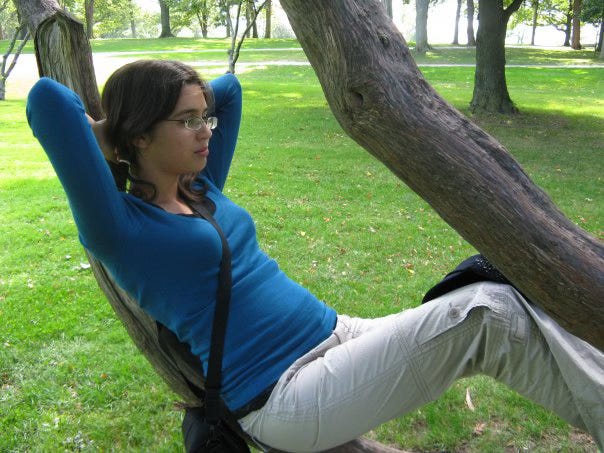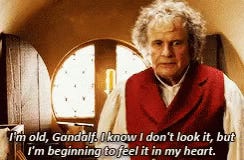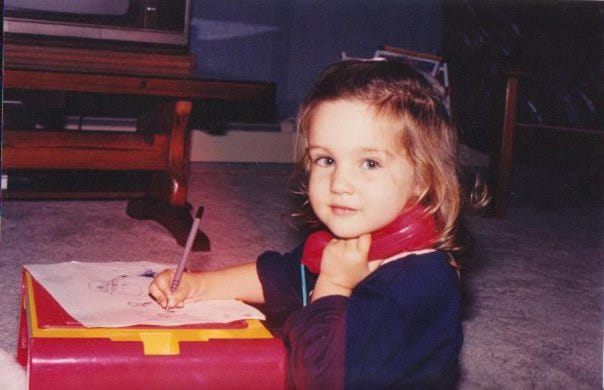Song of the Week: “Fifteen,” by Taylor Swift - “Back then I swore I was gonna marry him someday but I realized some bigger dreams of mine”
It’s back to school season, and that means that after a quiet summer campus is once again bustling with students. I know that it’s cliché to complain that every year the freshmen look younger, but this year is particularly disquieting.
Yesterday while walking to the train I saw a ghost: a girl with thin wire-rimmed glasses and wavy hair wearing a tiered white peasant skirt and a white tank top with a rhinestone butterfly, a blue paisley shirt tied around her waist. It was, detail for detail, the exact outfit I coveted when I was 11, and it felt like a punch in the stomach.
Intellectually, I know that trends cycle, but it’s another thing to finally be old enough to have seen a full cycle. More than that, though, I cringed at the girl’s outfit because I cringe at the way I dressed as a teenager. Why are you wearing that? I wanted to ask her. Don’t you realize how bad we looked?
There is perhaps no easier target for criticism and mockery than your own self as a tween or a teen. Lurching through the world in a cloud of hormones and Bath & Body Works perfume, covering acne with cheap makeup and writing “Mrs. Crush-of-the-Week’s-Name” in the margins of a textbook about the French Revolution.
As a society, we love to talk about loving your inner child, or healing your inner child. Playful, adorable, and innocent - she’s easy to love.
But loving the person I was at 11 and 15 and 19? That’s harder.
Cringe
I am always a little suspicious of people who say they miss high school. Sure, there are things I miss - like the ability to eat pizza late at night without getting heartburn - but for me, being a teenager was nothing so much as it was discombobulating. Every feeling ripped through me like a wave, crashing into me and knocking me off my feet and forcing me to give it my full attention.
As a tween, I was gangly and awkward and taller than all the boys in my class, like a newborn giraffe. Even when I got up early to flat-iron it into submission, my hair never looked quite right. I wore glasses, and later braces too, and to make matters worse from ages 11-14 I had to wear a bulky plastic back brace for scoliosis that made my clothes fit weird and sometimes left my entire torso tingling like it had fallen asleep. I didn’t shop at the right stores, and I wasn’t allowed to wear the things that I was sure would guarantee me infinite popularity: bikinis, halter tops, and low-rise sweatpants that said “juicy” on the butt.1
During the first two years of high school, I was home-schooled with my cousins, and spent my spare time watching old movies, reading British humorists, and secretly flipping through issues of Teen Vogue at the public library. I wasted hours on the IMDB.com message boards arguing with strangers about why “Sparrabeth” (the theoretical relationship between Pirates of the Caribbean’s Jack Sparrow and Elizabeth Swann) was “just lust” but “Willabeth” (the relationship between Will Turner and Elizabeth Swann) was “true love.”
And, worst of all, there was a terrible and humiliating chasm between my intense desire for a boyfriend and boys’ interest in me.
Looking back at the person I was then, it’s easy to cringe, to laugh, to point fingers. Look at her rubbing body glitter on her eyelids and wearing platform flip-flops. Look at her writing out lyrics from Relient K on the back of her notebooks. Look at her assigning a code name to the boy she has a crush on so she can talk about him while he’s in the room.2
There is comfort - and humor - in knowing I am not the only one embarrassed by my teen self. I have seldom felt more seen than I did by Lillian Stone’s satirical McSweeney’s piece “An Evening of Carnal Delights as Envisioned by My 10-Year-Old Self.” Much like my own, Stone’s adolescent fantasies include a home decorated with bead curtains as well as kissing Orlando Bloom.3 “I am 32,” she writes, tongue firmly in cheek, “which means I am old enough to spray a cloud of Britney Spears Circus perfume and then walk through it, letting the little droplets of perfume shower my bouncy curls and my big adult boobs.”
I suspect we cringe at our teenage selves because we fear that we might secretly still be that person, just with more responsibilities and less pimples. Is everyone staring at me? Are they laughing? Do they know I don’t fit in?
Easier to point the finger and laugh than to risk being friends with that weirdo and share in the derision.
All Children Grow Up
Last weekend I went to Stratford to see “Wendy and Peter Pan,” an adaptation of J. M. Barrie’s 1904 play (and 1911 novel) Peter Pan. Unfortunately, the play was overstuffed and messy, an uneasy mixture of over-the-top slapstick, contemporary innuendos, and plot additions that distracted from the original text. While no one in our group loved the production, I was the most disappointed because I was obsessed with Peter Pan for my entire childhood.
For years, I had vivid dreams about flying away to Neverland, and I never quite stopped believing that I might see Peter outside my window some night. When I was five or six my mom made me a Peter Pan costume, and I jumped around on the couch sword-fighting with my dad, who held a clothes hanger in one hand to play Captain Hook. When I went to Disney World for the first time the summer after first grade, the highlight was during the parade of lights when Peter Pan waved at me specifically. Because, obviously, he knew that I was unique in my deep and enduring love for him.
Though as a little kid I loved the animated Disney classic as well as Mary Martin’s 1954 stage musical, P. J. Hogan’s live-action Peter Pan (2003) arrived right as I needed it.4
In this Peter Pan, many of the peculiarities and darker themes of Barrie’s original text are restored. Captain Hook - played by Jason Isaac - is menacing and violent, but also strangely compelling. Wendy is creative and brave, but also curious about love and romance: a girl standing on the cusp of womanhood, equally afraid of and intrigued by the changes brought about by adolescence. And Peter Pan himself is charming and cocky, careless and vulnerable, and - to my tween self - the dreamiest boy I had ever seen.
I loved that version of Peter Pan because it was shot through with longing and with melancholy, with the awareness of mortality and the loss of innocence that comes with growing up. It felt how I felt.
So, this last weekend, when we were all so terribly let down by Stratford’s “Wendy and Peter Pan,” I suggested that as a corrective we rewatch that 2003 version of Peter Pan, which I hadn’t seen in at least fifteen years.
Rewatching that movie was surreal. Every frame, every dialogue, every note of the soundtrack was intimately familiar. The movie was just as I remembered it, but I - of course - was transformed.
It felt as if I was sitting on the couch next to my eleven-year-old self, experiencing the movie through both of our perspectives simultaneously. She had a crush on Peter; I saw an adorable child. She experienced the world through Wendy’s eyes; I empathized with Mrs. Darling. She wondered what it would be like to grow up; I knew.
We both, I am happy to report, loved the movie.
The Fear of Childishness
I recently came across a video essay in which TikTok user yayatizz addresses her seven-year-old self, describing all the things she does every day that would blow her mind: eating whatever food she wants, wearing whatever she wants, visiting the public library every day. “I think about you all the time,” she says. “I’ve never forgotten. I paint my fingernails in your favorite color…all of the things that I love about myself most, you already have inside of you.”
It reminded me of an essay by C.S. Lewis that I loved as a teenager, called “On Three Ways of Writing for Children,” In the essay, Lewis criticizes adults who are desperate to distance themselves from the fairy tales and other kinds of imaginative stories that they loved as children.
Critics who treat 'adult' as a term of approval, instead of as a merely descriptive term, cannot be adult themselves. To be concerned about being grown up, to admire the grown up because it is grown up, to blush at the suspicion of being childish; these things are the marks of childhood and adolescence. And in childhood and adolescence they are, in moderation, healthy symptoms. Young things ought to want to grow. But to carry on into middle life or even into early manhood this concern about being adult is a mark of really arrested development. When I was ten, I read fairy tales in secret and would have been ashamed if I had been found doing so. Now that I am fifty I read them openly. When I became a man I put away childish things, including the fear of childishness and the desire to be very grown up.
And so, in an attempt to grow up, I am trying to love that child - and the tween, and the teen - that I was.
I love her curiosity about the world around her, and the wealth of trivia she left for me to remember when I need it.
I love her imagination, and all the journal entries and poems and stories she wrote that helped me hone my craft.
I love her creative sense of style, which manifests in my funky earrings and thrift-store finds and penchant for overalls.
I love her big heart, which has found a home in my husband but still indulges in crushes on fictional characters from time to time: Outlander’s Jamie Fraser! Pedro Pascal in The Last of Us! Keira Knightley in everything!5
I love that - even when she was judgmental and insecure and tempestuous and strange - she was always trying her best. It’s all I could ask of her, or of me.
I am grateful to no longer be a teenager. I am grateful to have the autonomy I longed for, to make choices for myself - and live with the consequences of those choices. I can stay up too late reading, and plan trips to interesting places, and buy an ICEE whenever I feel like it.6
And I know now that there will inevitably come a day where I look back at the person I was today, and want to laugh. I will point to how I did my makeup or decorated my home and ask What was I thinking? I’ll question how I could be so hopelessly naive.
But I also know that I’ll look back with affection - that the flaws and insecurities I see in myself now will fade into the background, as they do again and again. “Look how young I was!” I’ll say. “Look how full of life!”
So I work hard, now, to give my younger self gifts. To honor the person she dreamed of being.
I wear bikinis and halter tops, though I still don’t wear low-rise sweatpants that say “juicy” on the butt.
My eighteen-year-old self wanted everyone to wear Converse sneakers at her wedding, so at twenty-eight I wore custom sparkly gold ones to mine.
Sometimes, when I’m drinking a cup of coffee or buying fancy cheese and olives at my favorite Italian grocer or looking out at the city from my window of my seventeenth-floor apartment, I realize how glamorous this all would have seemed to me as a teenager, and I try to remind myself: the life I have now is the one I dreamed of then.

When it comes to loving your younger self, what should I add to my syllabus?
I want to hear from you, whether it’s in the comments on this post or in emails to me directly at roschmansyllabus@substack.com!
Thank you, mom, for not letting your eleven-year-old wear sweatpants that said “juicy” on the butt.
That code name eventually became one of my PIN numbers. Who’s going to tell that sweet kid-turned-father-of-two that he’s with me every time I go to the bank?
Though she mentions him “striding into my home in full costume as Legolas from the first 20 minutes of The Fellowship of the Ring that I was allowed to watch.” Legolas is not in the first twenty minutes of The Fellowship of the Ring, but rather appears only a few minutes before the end of the first disc of the extended edition DVD. I knew this at 10, and I know it now.
In 2022, Taylor and I undertook the project of watching every one of Disney’s theatrical animated films in order, from Snow White and the Seven Dwarves to the present. Regrettably, Disney’s Peter Pan not only contains racist elements, but rather is permeated with so much consistent and obnoxious racism towards to Indigenous people as to make it unwatchable.
Pirates of the Caribbean, a movie for all seasons and understandings of my sexual orientation.
Back in June I fell into the habit of getting an ICEE from the student center on the way back from watering my garden, and soon it became the summer of ICEEs. Did you know that as an adult you can drink as many slushies as you want?







I’m not brave enough to tackle how my young self would think of how I ended up but LOVED the rendition of your journey. Great, entertaining reflections.